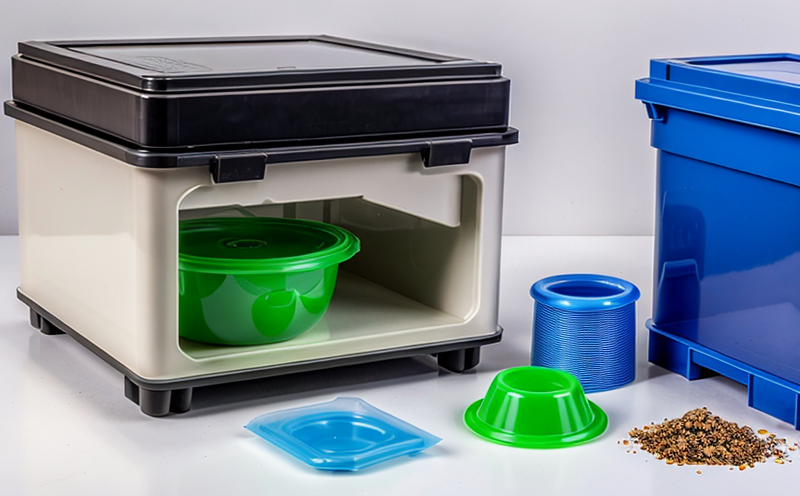EP 3.1.3 Plastic Containers for Pharmaceuticals Testing
The European Pharmacopoeia (Ph. Eur.) 3.1.3 specifies the requirements for plastic containers intended to hold pharmaceutical products. This service ensures compliance with these standards, which are critical for ensuring the integrity and safety of pharmaceutical packaging.
Our testing encompasses a wide range of parameters including mechanical strength, chemical resistance, compatibility with active pharmaceutical ingredients (APIs), seal integrity, microbiological challenges, and leachables/extractables. Each test is conducted using validated methods to ensure accurate and reliable results.
The primary goal of this service is to provide pharmaceutical manufacturers with robust evidence that their plastic containers meet the stringent requirements set by the European Pharmacopoeia. This ensures that the packaging remains stable under real-world conditions, thereby safeguarding the quality and effectiveness of the contained product.
Our team uses advanced analytical techniques such as gas chromatography-mass spectrometry (GC-MS), high-performance liquid chromatography (HPLC), and Fourier transform infrared spectroscopy (FTIR) to assess leachables/extractables. Additionally, we employ differential scanning calorimetry (DSC) and dynamic mechanical analysis (DMA) for thermal and mechanical property evaluation.
For microbiological challenges, we follow validated protocols that simulate the environmental conditions under which the packaging is likely to be used. This includes exposure to moisture, temperature extremes, and potential contaminants. Our testing ensures that any microorganisms present in the environment do not compromise the integrity of the container or the product it contains.
Compliance with EP 3.1.3 also involves assessing the compatibility between different components of the packaging system. This includes ensuring that the plastic container does not interact adversely with the API, excipients, and other materials within the pharmaceutical formulation. Compatibility testing is crucial to prevent degradation or leaching that could affect the efficacy or safety of the product.
| Parameter | Methodology |
|---|---|
| Leachables/Extractables | GC-MS, HPLC, FTIR |
| Mechanical Strength | DSC, DMA |
| Microbiological Challenges | Simulated environmental conditions |
The testing process begins with detailed sample preparation, which may involve sterilization and conditioning to simulate real-world use. Once prepared, the samples undergo a series of tests designed to evaluate their performance under various stressors.
Our highly experienced team of scientists ensures that every test is conducted according to the latest standards and guidelines. This includes adherence to ISO, ASTM, EN, IEC, and other international standards where applicable. The results are meticulously recorded and analyzed to provide comprehensive reports that meet the needs of quality managers, compliance officers, R&D engineers, and procurement teams.
By choosing our EP 3.1.3 Plastic Containers for Pharmaceuticals Testing service, you can be confident in the quality and safety of your packaging solutions. Our commitment to excellence ensures that you have the data and evidence necessary to make informed decisions about your product's integrity and compliance with regulatory requirements.
Scope and Methodology
- Leachables/Extractables analysis using GC-MS, HPLC, FTIR
- Mechanical strength evaluation via DSC and DMA
- Microbiological challenges conducted under simulated environmental conditions
- Compatibility testing between plastic container components and pharmaceutical products
Industry Applications
This service is particularly relevant for pharmaceutical manufacturers, packaging developers, and quality assurance teams. It ensures that the plastic containers used in drug delivery systems meet stringent regulatory requirements, thereby enhancing patient safety and product efficacy.
The tests conducted under this service are applicable to a wide range of pharmaceutical products, including tablets, capsules, injectables, and topical formulations. By ensuring compliance with EP 3.1.3, manufacturers can confidently market their products knowing that the packaging meets the highest standards for integrity and safety.
Our testing also supports ongoing research and development efforts in the field of pharmaceutical packaging. By providing detailed data on material compatibility, mechanical properties, and microbiological stability, we enable continuous improvement in packaging design and formulation.
Eurolab Advantages
- State-of-the-art facilities equipped with the latest analytical instruments
- A team of experienced scientists specializing in pharmaceutical testing
- Comprehensive reporting tailored to meet your specific needs
- Expertise in regulatory compliance and international standards





